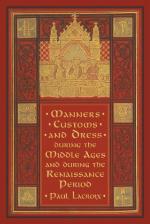The right of shipwrecks, which the nobles of seaboard countries rarely renounced, and of which they were the more jealous from the fact that they had continually to dispute them with their vassals and neighbours, was the pitiless and barbaric right of appropriating the contents of ships happening to be wrecked on their shores.
[Illustration: Figs. 24 and 25.—Varlet or Squire carrying a Halberd with a thick Blade; and Archer, in Fighting Dress, drawing the String of his Crossbow with a double-handled Winch.—From the Miniatures of the “Jouvencel,” and the “Chroniques” of Froissart, Manuscripts of the Fifteenth Century (Imperial Library of Paris).]
When the feudal nobles granted to their vassals the right of assembling on certain days, in order to hold fairs and markets, they never neglected to reserve to themselves some tax on each head of cattle, as well as on the various articles brought in and put up for sale. As these fairs and markets never failed to attract a great number of buyers and sellers, this formed a very lucrative tax for the noble (Fig. 26).
[Illustration: Fig. 26.—Flemish Peasants at the Cattle Market.—Miniature of the “Chroniques de Hainaut.” Manuscripts of the Fifteenth Century, vol. ii. fol. 204 (Library of the Dukes of Burgundy, Brussels).]
The right of marque, or reprisal, was a most barbarous custom. A famous example is given of it. In 1022, William the Pious, Count of Angouleme, before starting for a pilgrimage to Rome, made his three brothers, who were his vassals, swear to live in honourable peace and good friendship. But, notwithstanding their oath, two of the brothers, having invited the third to the Easter festivities, seized him at night in his bed, put out his eyes so that he might not find the way to his castle, and cut out his tongue so that he might not name the authors of this horrible treatment. The voice of God, however, denounced them, and the Count of Angouleme, shuddering with horror, referred the case to his sovereign, the Duke of Aquitaine, William IV., who immediately came, and by fire and sword exercised his right of marque on the lands of the two brothers, leaving them nothing but their lives and limbs, after having first put out their eyes and cut out their tongues, so as to inflict on them the penalty of retaliation.




